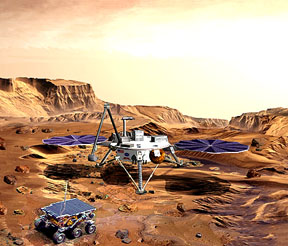This is an artist's depiction of the Mars 2003 rover and lander.
Click on image for full size
Courtesy of NASA
NASA Will Roam Around Mars with Rover (Updated!)
News story originally written on August 13, 2000
Make that two rovers! NASA has announced that twin rovers will visit Mars in 2003.
The original mission would have sent just one, but scientists couldn't pass up this great
opportunity. Although the machines will look identical, their missions will be very different.
Scientists plan to send the pair to very different regions of the Red Planet. For example, one rover
may study what looks like an old riverbed, while the other studies the area around Olympus Mons.
You might also be interested in:
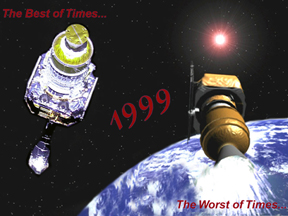
It was another exciting and frustrating year for the space science program. It seemed that every step forward led to one backwards. Either way, NASA led the way to a great century of discovery. Unfortunately,
...more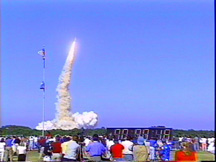
The Space Shuttle Discovery lifted off from Kennedy Space Center on October 29th at 2:19 p.m. EST. The weather was great as Discovery took 8 1/2 minutes to reach orbit. This was the United States' 123rd
...more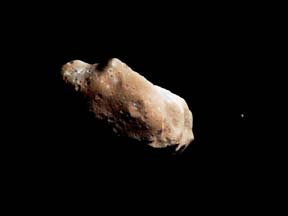
A moon was discovered orbiting the asteroid, Eugenia. This is only the second time in history that a satellite has been seen circling an asteroid. A special mirror allowed scientists to find the moon
...more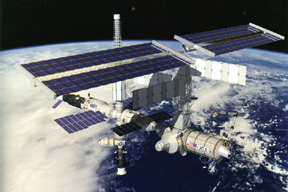
Will Russia ever put the service module for the International Space Station in space? NASA officials want an answer from the Russian government. The necessary service module is currently waiting to be
...more
A coronal mass ejection (CME) happened on the Sun early last month. The material that was thrown out from this explosion passed the ACE spacecraft. The SWICS instrument on ACE has produced a new and very
...more
J.S. Maini of the Canadian Forest Service called forests the "heart and lungs of the world." This is because forests filter air and water pollution, absorb carbon dioxide, release oxygen, and maintain
...more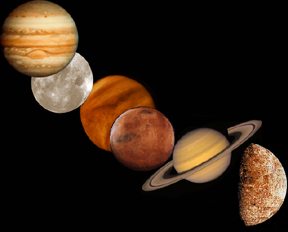
In late April through mid-May 2002, all five naked-eye planets are visible at the same time in the night sky! This is includes Mercury which is generally very hard to see. You won't want to miss this!
...more


